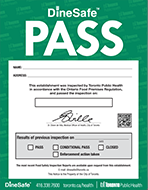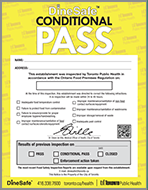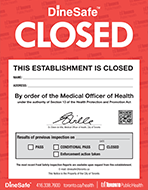
The DineSafe Inspection system is based on Provincial and Municipal regulations.
The Ministry of Health requires each Board of Health in Ontario to follow a standardized process that assesses the conditions of an establishment, based on the Ontario Food Premises Regulation (493/17). DineSafe inspections also include requirements as set out in municipal by-laws. Food premises are inspected at a frequency established by the Ministry of Health according to identified risk levels.
In 2011 DineSafe won the Samuel J. Crumbine Consumer Protection Award for providing outstanding food protection services – the first time an organization outside the United States has won this prestigious award.
Every eating and drinking establishment in the City of Toronto receives a minimum of one, two, or three inspections each year depending on the specific type of establishment, the food preparation processes, volume and type of food served and other related criteria. To ensure a public health inspector (PHI) from Toronto Public Health is legitimate, follow these steps:
The failure of an eating and drinking establishment operator to meet the minimum requirements or standards set out in legislation is referred to as an infraction.
There are three types of infractions that have been developed under the DineSafe Food Safety Inspection and Disclosure Program (Crucial, Significant and Minor) covering all of the requirements under the Ontario Food Premises Regulation (493/17).
The details of food safety inspections conducted over the past two years are reported on this site and can be downloaded from the City’s open data server. Other Municipal bylaw infractions are also recorded during the inspection, however these infractions do not present a health hazard.
For more information see the Ontario Food Premises Regulation (493/17).
Every drinking and eating establishment in Toronto must continually and prominently post the most recent food safety inspection notice, as issued without alteration, at or near the main entrance.
Information about the three types of notices can be found below.

A Pass notice will be issued when only minor or no infractions are observed during an inspection.
If minor infractions are repeated at the next inspection, the Public Health Inspector may issue a ticket to obtain compliance. Fines range from $55 to $465 depending on the severity of the infraction.
Examples

A conditional pass notice will be issued when one or more significant infractions are observed during an inspection.
When issued, a Public Health Inspector will re-inspect an establishment within 24-48 hours of the initial inspection. If the infractions are corrected and no other infractions or only Minor Infractions are found, a Pass Notice will be issued. If the infractions are not corrected by the time of the first re-inspection, a ticket will be issued and a second re-inspection will be conducted at a later date. If at the time of the second re-inspection the items have not been corrected, a summons to court will be issued and a referral to Toronto’s Municipal Licensing and Standards Division may occur.

A closed notice will be issued when one or more crucial infractions observed during an inspection are not corrected immediately. A food establishment can only be closed when a health hazard is present.
An Order to Close the establishment and/or remove the health hazard will be issued. A Public Health Inspector will visit daily to make sure that the establishment remains closed. Failure to comply with an Order to Close will lead to additional charges. When all of the infractions listed in the Order and all other significant or crucial infractions are corrected, the establishment will receive a Pass Notice and may be re-opened. Any repeated or new crucial infractions may result in the operator being issued with a summons to court and referral to the Licensing Tribunal for further action.
Examples